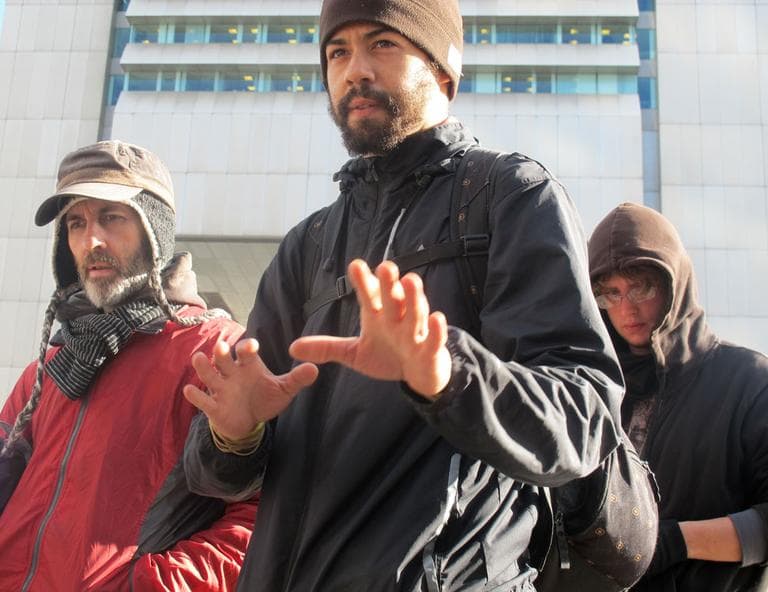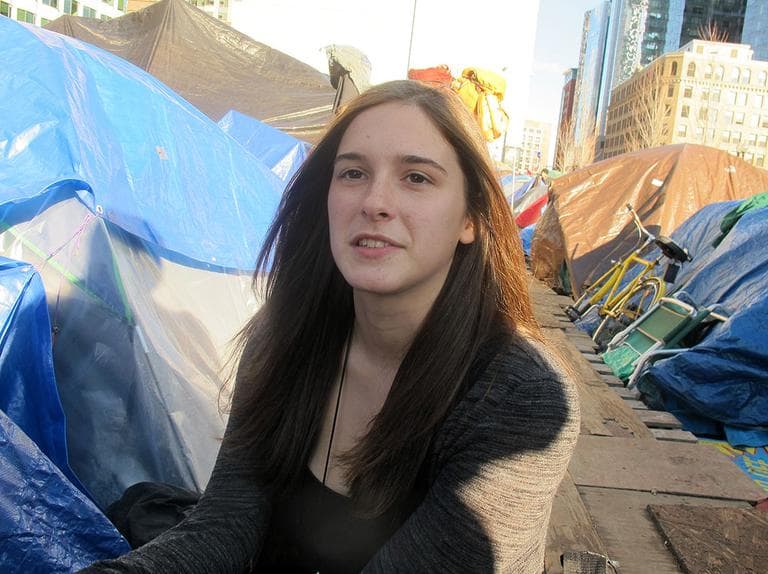Advertisement
In Court, Occupy Boston Fights To Keep Encampment
Resume
Occupy Boston's temporary restraining order against the City of Boston runs out Thursday. All parties are back in court Thursday morning to decide whether police have a right to evict protesters without the court's approval and whether protesters have a First Amendment right to stay in Dewey Square.
Half a dozen other protesters were handing out flyers to people waiting to buy lunch at food trucks across from South Station Wednesday.
"We're from Occupy Boston and we're just asking you guys to call in the mayor's office today to help us not get evicted from Dewey Square."
Back in the encampment, people were starting to come up with contingency plans.
"Everybody's prepared," said protester Elizabeth Holmes. "I've pretty much accepted it. If it comes it comes, if it doesn't it doesn't."
Organizers are urging people to find a place to go, and a place to store their stuff.
"It would be very hard for me to let this space go," said Ana Aizman, a comparative literature graduate student at Harvard. She's camped in Dewey Square more than a month, and carries a walkie-talkie because she's on the safety committee.
"On the other hand, it is very hard to keep up with it, especially when we feel like the city makes it very difficult to make this place better. If we can't bring in winterized tents, we can't prepare for the winter, we also can't take precautionary measures against individuals here who don't behave like they're part of a community. It would be ideal if we could winterize and at the same time narrow down who is part of Occupy Boston and who is taking advantage of the cops staying away."

Lawyers went to court to prevent what's happened in other cities, where police have evicted protesters during the middle of the night, most recently in Los Angeles and Philadelphia. The Occupy Boston side argues that camping out — and forming an alternative society — in front of the Federal Reserve building is part of the protesters' message, and therefor protected as free speech.
But the city said in court documents that the tents are a fire hazard and the living conditions could lead to the spread of communicable diseases and other health problems.
And Mayor Thomas Menino said there also have been dangerous incidents at the camp.
"Well, there was that drug issue one time, and there was somebody trying to scuffle," Menino said. "And you know, this can happen anywhere. But I just want to make sure I have the tools to maintain public safety regulations within that open space."
Supporters of Occupy Boston say it's unfortunate the city is focusing on public safety.
Carol Rose, the executive director of the American Civil Liberties Union of Massachusetts, helped coordinate free legal representation for the protesters. She said the city had never mentioned public health and safety threats before now.
"The court's current order that's in place right now, permits the city to go in right now if there are actually imminent threats to public health — fire or violence, public safety issues," said Rose. "In fact, the city, the police have been invited in by Occupy residents when there are instances of public safety at issue."
Another legal challenge might have to do with authority. The judge worried that this so-called leaderless group was so amorphous she wouldn't have anyone to hold responsible in a court order. So she asked the attorney for Occupy Boston to ask protesters at their meeting whether they would honor any court orders she gives.
Protesters wouldn't vote on this, so, instead, the attorney got signed affidavits from 60 protesters saying that as individuals they would honor such a court order.
"I don't think we should be asking the system that we're fighting whether we can fight it or not," said Boston University student Ali Jackson. She wouldn't sign an affidavit.
"But I respect the idea that everyone can approach things in different ways. That's sort of the power of this movement is that everyone's actions are respected. But personally, I'm not going to say that I agree with the court when I clearly don't agree with the court. Otherwise I wouldn't live in a tent in the cold if I agreed with the system."
Occupiers in other cities have had to find new ways of protesting without tents. Depending on what the judge decides, Boston's occupiers may have to do that, too.
This program aired on December 1, 2011.